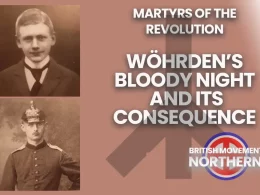In the United States, as in Europe, trust in the mainstream media has plummeted. In Germany, the National Socialist term “Lügenpresse” (lying press) has surged in popularity. In America, the term ‘fake news’ is widespread. This distrust of the media can only help our cause by leading our people to open their eyes and ears to alternative viewpoints.
The controlled media doesn’t merely keep its viewers in the dark, ignoring things it doesn’t want you to know: rather, it serves to propagandise its audience, just like Big Brother did in George Orwell’s book, Nineteen Eighty-Four.
And just because all the different media outlets are telling you the same thing doesn’t mean that it is right. Instead, assume that they’re all spreading the same false information and that something is really wrong.
What is the rationale behind the existence of one, universally accepted perspective on all subjects, and why are those who challenge these established conventions sometimes labelled as racist, hateful, conspiracy theorists, or far-right extremists?
The use of fundamental propaganda strategies is the act of defaming those who hold opposing viewpoints while simultaneously attributing to them the very actions or behaviours that one engages in, with the intention of diverting attention away from oneself. The infamous ‘Big Lie’ technique used to attack NS Germany instantly springs to mind.
The media’s pervasiveness in modern life, along with the fact that many people continue to believe that it is trustworthy despite repeated evidence to the contrary, makes this strategy highly effective.
In one now notorious documentary, produced by the BBC’s Panorama series and broadcast in June 2011, it claimed to show secretly filmed footage of three Indian child labourers pretending to work on ‘a sequinned shirt acquired from the real Primark workshops 300 miles away.’ The footage had actually been staged, and the Panorama crew’s driver/translator, was heard telling the youngsters to: “Get on with the work, little boy,” and “keep quiet and get on with job.”
The BBC Trust wouldn’t admit that the footage was fake. It did concede that “on the balance of probabilities, it was more likely than not that the Bangalore footage was not authentic”.
As with personal relationships, we should presume the contrary; once we learn that someone has lied to us, we never again have the same amount of faith in them. Why don’t we do this for the media, which has been exposed as regularly fabricating information regarding the most crucial issues?
Resources:
Top Image: “Lügenpresse” banner seen in a Pegida demonstration. Opposition24.de, CC BY 2.0, via Wikimedia Commons.
The British Movement welcomes articles for possible inclusion on this site from members and supporters across the North of England. Please remember that we have to operate within the laws of this country – we will not include any content that is against the current laws of the United Kingdom. News reports should be topical and be relevant to the regions covered by this website.












